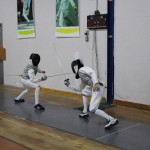
Off the Piste: Food, Hydration, and all that stuff that keeps you going.
While I’ve spent a lot of time writing about all the things you can do to enhance your training in the club and on strip, I’m taking this month’s article to stress the importance of some very simple things you can do to keep yourself running at full throttle during the most stressful and busiest time of the season.
February. For many fencers it’s the mid-year marker, with Junior Olympic Championships and Capital Clash SYC, it’s a point in our training where we want to peak in our fencing. However, this time of year is also the height of flu season, cold weather, and mid-terms exams. As we strive for excellence both on the strip and in the classroom, special care needs to be taken to ensure that our mental and physical health don’t take any hits and we don’t get stretched too thin.
Get Enough Sleep
Many young athletes don’t realize this, but sleep is a huge factor to your success both as an athlete and student. As you amp up for competitions and exams, it can seem like a reasonable short term solution to cut back on sleep to add more study time without compromising practice time. However, you want to be careful on how many nights you go cutting even an hour of rest. Recent studies have shown that accumulative sleep deprivation can result in cognitive functioning equal to that of subjects who went two nights without any sleep at all. As little as 6 hours of sleep over two weeks can create major impairments to mental and physical performance, with decreases in motor function and coordination, emotional stability, and impaired memory (not good for those test you’re studying for).
The recommended amount of sleep for an average adult is 7-8 hours a night, even more for children and teens (9-10 hours is ideal for teenagers, but at least get to 7 or 8 on a regular basis). Allowing yourself to get enough sleep will help keep stress levels down and improve the quality of your performance. Your immune system will thank you as well. If time is a constraint, consider cutting back a practice during a study week. Try not to skip a whole week’s practice as returning after such a gap could set back your training.
Eat Well
Between school, fencing practice, orchestra, robotics, family obligations, and shoveling snow, who has time to think about prepping meals? However, this is another area where a little extra thought will go a long way to improving your overall health and performance and is completely worth the work.
For an in depth guide on how you should be nourishing your athletic self, take a look at Nancy Clark’s Sport Nutrition Guidebook. Here are some simple tips from Clark’s book for improving your nutrition:
Variety – “The more different foods you eat, the greater amount of different nutrients you consume.” Think about combining several foods to one meal, attempt to have some protein, carbohydrates, fruit, and vegetables in one sitting. For example, a roast beef sandwich with a side of carrots and fruit for dessert can make a well rounded lunch. Try to very what you eat and avoid the exact same thing week after week. Eating the same foods means the same nutrients. Challenge yourself to see how many different foods you can incorporate into your diet in a week.
Wholesomeness – “Choose whole or lightly processed foods as much as possible.” Whole fruits in leu of fruit juices provide more nutrients, same goes for whole wheat breads verses white bread. Opt for peanut butter on wheat bread for a snack over processed energy bars.
Moderation – “Rather than think about food as good or bad, think about moderation.” It’s not necessary to cut out any one food so long as you maintain moderation of foods like soda, candy, and fries. Create a balance of what you eat throughout the day, if you have fries with lunch, then counter it with a healthful turkey sandwich and veggies for dinner.
For young athletes, it’s critical to eat through the day, beginning with breakfast. For some athletes, they may find they don’t have enough time to sit down for a full meal before heading to school. That’s ok, there are ways you can work in a fully nutritional breakfast that is better than a poptart. Some athletes pack their breakfast ahead of time (such as peanut better and banana sandwiches and juice) and eat on the way to school. Consider prepping a quick breakfast that you can eat on the go: throw some cereal into a yogurt cup, bran muffins with a little jam, bagels spread with peanut butter and raisins, or have a banana with a bottle of lowfat milk. These are all items that will help energize your morning, and you’ll find that your morning meal will help your concentration throughout your morning classes and keep you from feeling starved by lunch time.
Like many student athletes you may not be able to control when your meals occur (some students have lunch as early as 10am). This is where it’s important to make certain you’re fed throughout the day. Even if you eat breakfast at 7 or 8am, lunch at noon, by the time you arrive to practice you’ll be getting hungry again. Appropriate snacks can be essential to ensure optimal focus for your afternoon training session. Think about packing some trail mix, a banana, or crackers for your pre-practice snack. This will help you remain energized and focused for your afternoon or evening practice. Follow up with well balanced dinner. As suggested above make sure you add variety to your diet, combining both carbohydrates, protein, fruits, and veggies, especially post training as your body will be in need of refueling.
Hydrate.
Getting enough water on a daily basis is critical for healthy living of any individual. For an athlete, hydration can be the difference between a crippling leg cramp and pushing to the next level of your training. In addition, the mechanism that produces thirst, sweat loss, may not be efficient enough to signal when your body needs fluid replacement. By the time you become thirsty during activity, your body could already have lost 1% of it’s body weight in sweat (this can be equivalent to 1 to 1.5 pounds).
The key to maintaining good hydration is to drink your fluids prior to becoming thirsty. You can measure how much water you’ll need to replace by weighing yourself pre and post your workout (the amount of weight loss between the start and end of your workout is how much fluid you will need to replace). Another, simpler (if somewhat grosser) way to track your hydration is to pay attention to the color of your urine. If your urine is dark, you are likely dehydrated and need to increase your fluid intake. The lighter the color of your urine, the better your hydration level.
Besides monitoring your urine color and weight loss during exercise, you can also track how you feel. Feeling chronically tired, lethargic, and headachy are all symptoms of dehydration.
These three simple things, sleep, nutrition, and hydration, are critical to your success both as an athlete and a student. You’ll help your body stay healthy, and aid in it’s ability to improve mentally and physically. Do yourself a favor, make the time for 7-8 hours of sleep each night, drink plenty of water, and fuel your body with nutrients that will make you energized.



